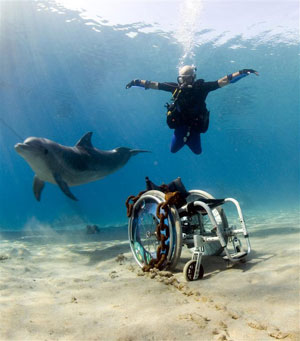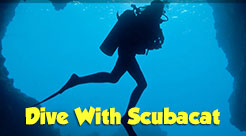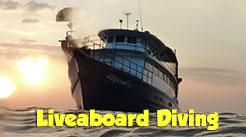DDI Professional Programs
DDI Professional Training
DDI professional training adds to the diving professional a new set of tools and knowledge to train disabled divers safely and to certify their student as a scuba diver, with varied levels of limitations depending on the students ability to perform program requirements and standards.

To become certified as a DDI Professional you must demonstrate that you have the ability to successfully train / guide individuals with physical disabilities in an open water environment. Learning to deal with all types of disabilities a Dive Professional can encounter is not possible in a three day training program. In order to develop your experience you must work with the disabled. Update your knowledge and training methods, read all newsletters sent to you, and work with rehabilitation centers and research information specific to the disabilities you encounter.
The PRO training comprises of knowledge development, Confined and Open Water training and the DDI training programs and standards. In the knowledge development section you learn about all the different types of disabilities you can expect to encounter when training disabled divers. It is important that you, the Professional, have a good understanding of the type of disability you are dealing with and not rely on hearsay, as it is of utmost importance that you feel confident with your students. It is equally important that your students feel confident in your knowledge and ability in dealing with their specific problems. To help increase your knowledge on the various disabilities you may encounter, we suggest that you surf on the internet for more specific information.
The confined water training section deals with specific training, what to expect, and how to deal with problems encountered by your students. It is important that you understand the difficulties your students may experience during training and how you can assist them in overcoming these. By simulating being disabled and then alternating as the Instructor for disabled students, you develop a clearer understanding of problems that are encountered (during the pool training disabled divers should be invited to assist if possible). You will need to consider the disabilities of the divers you will be training and be sensitive and aware of the special requirements that are specific for each student.
In the open water, you are placed in the role of being the disabled diver and subsequently as the instructor/guide for disabled divers. You will also learn about how to evaluate dive sites and their accessibility, and develop a general awareness of other logistic considerations, which are necessary when you are training or accompanying disabled divers.
Costs
For full up to date pricing on any of the above courses please contact us with a brief overview of your circumstances.










